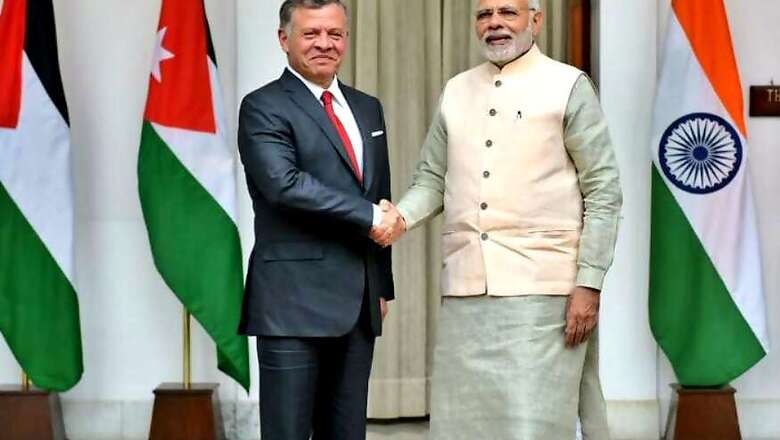
views
New Delhi: Emphasising on the Sufi-syncretic values of Islam, Prime Minister Narendra Modi on Thursday said the fight against terrorism and radicalisation was not against any religion, but against a mindset that misguides the young.
Addressing the ‘Islamic Heritage: Promoting Understanding and Moderation’ conference, Modi said, “Muslim youth in India had the Quran in one hand and a computer in the other. Youth are radicalized and violence is inflicted on the innocent. Together, we can fight terrorism.”
The PM was speaking in the presence of Jordan’s King Abdullah II who is known for his global initiative to fight radicalisation and terrorism in the name of religion and is also custodian of the Al-Aqsa mosque, the third holiest site in Islam, located in the Old City of Jerusalem. Speaking at the event, King Abdullah II said, “Ideologies of hate distort the word of God. Faith is supposed to draw humanity together.”
Praising the PM’s speech, Faizur Rahman, an independent researcher and secretary-general of the Chennai-based Islamic Forum for the Promotion of Moderate Thought, said, “Indian Islam is the best interpretation of Quranic Islam. Indian Muslims have always believed in Islam being syncretic. This conference is again the reiteration of that faith. Not long ago, the Prime Minister said that Indian Muslims are not at all radicalised.”
He added that when the Modi government says there is no radicalisation among Indian Muslims, then there is also no room for talk of Love Jihad. “Islam in India is what real Islam is — syncretic and harmonious. It does not believe in compulsion or forcing religion on anyone. In fact, the whole narrative of Love Jihad falls flat on its face with no evidence to back it up with,” he said.
Ali Khan Mahmudabad, Assistant Professor of political science in Ashoka University, however, said comparing Islam in India to Sufism is “divisive”. To back up his claim, Mahmudabad recalled the World Sufi Forum of 2016 which brought people with a particular religious identity closer to the political power, earning them the mistrust of other members of the community.
“The way the BJP and the RSS talk about ‘acceptable Islam’ creates further divisions among Muslims. It brings a particular group closer to power, or at least creates the perception that they are aligned with the government. This is far removed from history as Sufis have always maintained a distance from political power. In fact, they often rose up in rebellion against imperial and tyrannical powers.”
“Their views on radicalisation show their uni-dimensional understanding of terrorism. It is as much the result of socio-economic, political, geo-strategic, psychological and class factors as it is of religion. The approach of solely holding religion responsible for terrorism is reductionist and shows the shallow understanding such people have of modern-day terrorists and radical groups. Such an approach can never solve the problem and in fact will only exacerbate it,” Mahmudabad added.
Disagreeing, Maulana Azad University Jodhpur V-C Akhtarul Wasey said the conference wasn’t just about Sufi or Salafi Islam. “It had representatives from all streams of Islam — Barelvi, Salafi, Sunni etc. There was nothing about promoting any single philosophy of Islam. And all participants came together unanimously against terrorism, radicalisation and violence. In this global village, the only model of Islam which can be workable is that of India because Islam in India is basically operating for last one thousand years in multi-cultural set up. It is syncretic.”


















Comments
0 comment